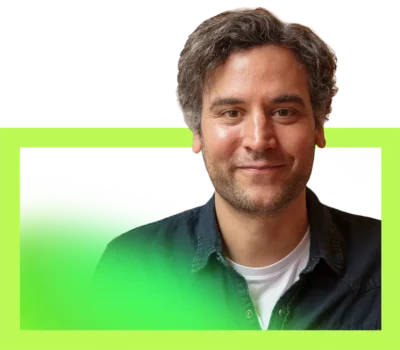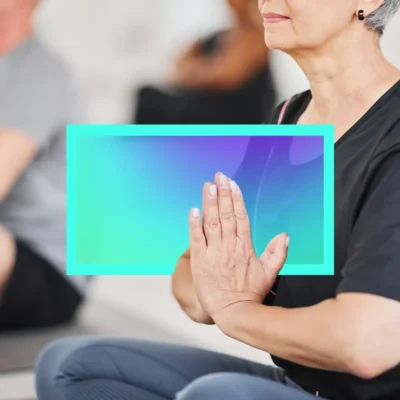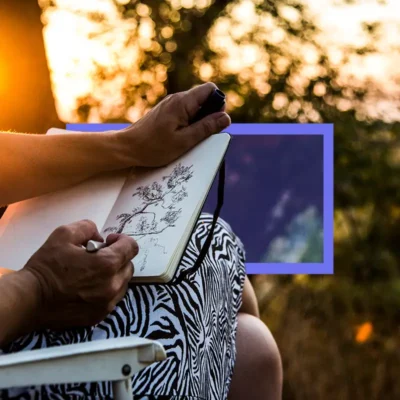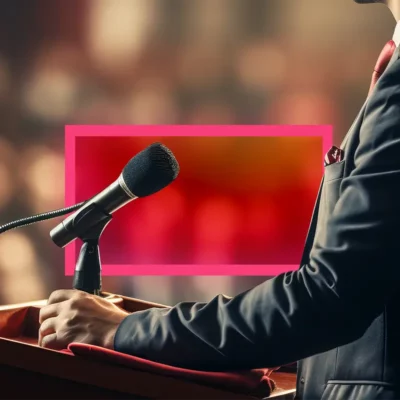Finding permission to pursue my own dreams
Tuxedo-clad, face covered in makeup, hair slicked and parted in the middle, jumping around a creaky stage, teenage Josh Radnor (now an actor, producer and director) makes a life-changing discovery: He can act. And he loves it. But what to do now? At 16 years old, all Josh knows is that his ambition to act is at odds with everything that surrounds him, and with what he thinks his family expects of him. He can’t imagine the future he is born to live — that is, until a guidance counselor calls him into her office. With a stern order to never stop acting, Josh is seen for the first time. He must borrow courage from that high school guidance counselor until he finds his own courage onstage.

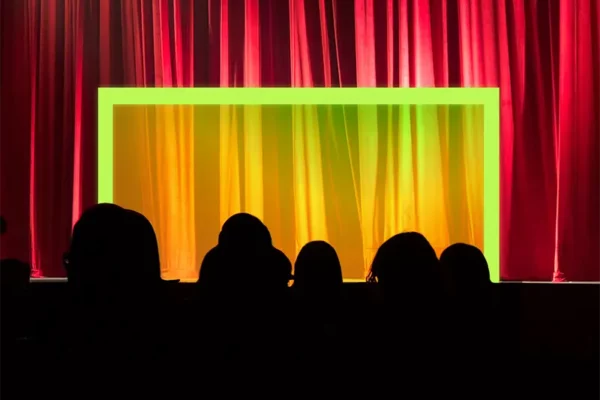
Table of Contents:
Transcript:
Finding permission to pursue my own dreams
JOSH RADNOR: Of the three guidance counselors at the high school, Mrs. Oreski was the one to get. She had a special feel for the teenage mind – the insecurity, the false bravado, the wanting to simultaneously stand out and disappear. One sensed her allegiance to be wholly with the students and not the administration. Everything she said seemed to be delivered with a wink, a reassuring squeeze of the arm or pat on the back. Her whole persona seemed to whisper, “It’s going to be okay.” Which, really, might be all anyone would ever need to say to a teenager.
ROHAN GUNATILLAKE: Sometimes all we need are a few comforting words. Spoken at the right time, they can change the course of our life. I wonder if anything like that has happened to you? It certainly has for me.
Actor, filmmaker, and musician Josh Radnor is perhaps best known for his lead role in the Emmy award-winning show “How I Met Your Mother”. And in this week’s episode he shares a story from a vulnerable time in his life when what he most needed was a nudge – a truth pointed out that was so close to him he couldn’t quite see it.
In this series, we blend immersive, first-person stories with mindfulness prompts to help you find a moment of calm at any time of the day. I’m Rohan, and I’ll be your guide on this episode of Meditative Story. From time to time, we’ll pause the story ever so briefly for me to share an observation. My hope is that these prompts will help you experience Josh’s story more deeply.
The body relaxed. The body breathing. Your senses open. Your mind open. Meeting the world.
RADNOR: This is what I remember: The slashes of lipstick blasted across her front teeth like graffiti. Hair so fiery red it almost matched her lipstick, parted in the middle and feathered to the sides. What sitting in her office felt like, that little nook tucked away from the clang of gossip and lockers. Her reassurance with each visit that whatever we discussed would never leave that room. And how I believed her.
And the last thing she taught me, when she reappeared at the school, unsteady and pale, for one final week after a long, curious absence: When folding paper with two folds, for business envelopes, leave one edge slightly long so the reader can grab the lip of the longer end to shake the letter open. To this day, on the increasingly rare occasions I fold an actual letter, it’s impossible for me not to think about this. And her.
Bexley, Ohio is a small, well-to-do neighborhood in Columbus, just east of downtown. The blocks are square, the streets are tree-lined, and the Fourth of July parade has to be seen to be believed. It’s a safe and warm place to grow up, but there’s also a faint whiff of self-satisfaction about the town, a largely unspoken belief that its residents are the luckiest people in the world, and how sad for those sad people who have to live elsewhere in other sad, non-Bexley towns.
That said – and this complicates one’s recollections – it also is really special, the kind of place you bring friends to years later and they look around and say, “You actually grew up here?” There are fireflies in the summer and gorgeous snowfalls in the winter. Almost all of my friends’ parents are still married. Rubino’s, the best pizza place on the entire planet, is there. There are three unbelievably great ice cream shops all within walking distance of each other.
For all its small town sweetness, the public high school was a fiercely socially competitive place, stratified in all the clichéd suburban ways. The transition to Bexley my freshman year from the womb-like Jewish day school where I’d spent the previous nine years was harrowing. Gone were the mandatory yarmulke and tzitzit. In their place came an intense longing to dress right and say the right things and hang out with the right people.
Simply put: I wanted to be cool. And with my oversized ears, more-than-occasionally pimply chin, and can’t-do-much-with-it Jewish head of hair, I was terrified I wasn’t. My first year of high school I was never able to shake some vague terror that a reputation-destroying event might be just around the next corner.
GUNATILLAKE: Can you see Josh here? Walking the corridors, sitting in class, wrapped up in his desire to be cool. What about you? Is there a way you want to be seen by the world? Or are you ok with how things are?
RADNOR: One afternoon during my sophomore year, my friend Debbie Shell tells me she wants to audition for the chorus of “Oklahoma”, the Spring musical, but she’s nervous and wonders if I’ll come to the auditions in the auditorium after school and sit with her. I say, “Yeah, sure, why not?”
Sitting in the theater next to Debbie, I watch student after student sing along to plunked out notes on the piano and read short sections from the script, and something fires off in me: These guys aren’t that great at this and I think I can do this better than them.
I’m slightly embarrassed of this thought; it feels arrogant and uncharitable. But it also feels true. And then, out of nowhere, whoever’s running the auditions points at me and asks if I’m going to audition. As if an invisible hand grabs ahold of my shirt collar and pulls me forward, I find myself hopping up onto the stage and singing scales along with the music director. And then I read a bit from the script. I’m called back for the next day’s second round of auditions where we read and sing some more. The final cast list is posted the following day: WILL PARKER – Josh Radnor.
“Oklahoma” is fun but I’m terribly green as a performer. I love the experience, but the stage doesn’t truly sink its hooks into me until the following year when I’m cast as the Emcee in “Cabaret.”
For about a month before auditions, until opening night, I obsess over the Broadway original cast album of “Cabaret”, the CD of which I check out and re-check out of the Bexley Public Library for months. Whenever my parents and sisters are gone and I have the house to myself, I convert the living room, which houses the family stereo, into a makeshift stage, singing loudly along to Joel Grey’s mysterious, nasal-voiced Emcee, and trying out my new moves.
When my dancing and singing spin me into the adjacent dining room, I catch sight of myself in the mirrored credenza which holds a menorah, Shabbos candle holders, an ornate Kiddush cup, a Seder plate, and other assorted Judaica. And then it hits me: a sixteen-year-old discovering, for the first time, his talent for performance. Who knew I could be so bold and free and expressive? Who knew I could sing on pitch and move with some grace and showbiz pizzazz with a cane and a smirk? Who knew I could do such a fantastic Joel Grey impersonation? It feels so natural to me, less like acquiring a new skill than remembering one.
That my whole performance is basically an outright rip-off of Joel Grey’s take on the character – minus the sexual ambiguity which, suburban teen that I am, I know nothing of – doesn’t really matter. Somehow I manage to bring a hint of professional polish to that high school auditorium. But it’s bigger than that. Tuxedo-clad, face covered in white make-up, hair slickly parted in the middle, jumping around a creaky stage imitating Joel Grey shifts something for me.
GUNATILLAKE: If you can picture it, there’s a relaxation, a freedom in Josh’s performance. In your body right now where can you most notice tension? Your shoulders, your face, your hands? Notice it, really feel it, feel into it. And let go. Fall into a freedom, a looseness in you.
RADNOR: At one of the performances my parents are seated front row center. There’s a bit where I walk across a thin wooden plank over the orchestra pit towards the audience and that night I sit in an empty seat next to my parents. I kind of just stare at them, slightly menacingly, and it gets a big laugh as a good percentage of the audience know who these people are and why I’ve singled them out. I don’t know why that moment has stayed with me.
My parents are delighted, of course, but maybe it has something to do with a subtle shift in power. I suddenly hold the cards and control the moment. I’m the Emcee after all. Everyone is a guest at my party, including my parents. Playing the part gives me a different sense of agency, a newfound confidence. I feel some internal light click on. I’m suddenly more awake.
After the show, I see my guidance counselor Mrs. Oreski pushing her way through a swarm of well-wishers and beaming parents. When she reaches me she grabs my arm and leans into my ear. No congratulations or compliments are offered. Only this: “You’re to come see me first thing Monday morning before homeroom.” Her tone is stern and insistent. I know she means business. And then she walks away.
Of the three guidance counselors at the high school, Mrs. Oreski was the one to get. She had a special feel for the teenage mind – the insecurity, the false bravado, the wanting to simultaneously stand out and disappear. One sensed her allegiance to be wholly with the students and not the administration. Everything she said seemed to be delivered with a wink, a reassuring squeeze of the arm, or pat on the back. Her whole persona seemed to whisper “It’s going to be okay.” Which, really, might be all anyone would ever need to say to a teenager.
So there I am in her office the following Monday before homeroom, as instructed. No small talk, no questions. Simply an order: “You are never to stop acting. Even if you become a lawyer and do community theater, you must keep acting.” And then she looks at me with a steeliness I’m unaccustomed to and says: “Promise me.”
I promise.
How had she known? I had told no one. But it was true: I didn’t want to stop acting, ever. Surely I would have to though. Adulthood as I understood it was pretty much the opposite of an extracurricular activity. It was jobs and suits and bills and mortgages laced with an air of frustration and regret. No sane person – from a good family in Bexley, Ohio, no less – made their living as a stage actor.
I hadn’t given much thought to a career at that point, but I guess I kind of half-assumed I’d be a lawyer like my father, not owing to any great interest in or love of the law but stemming more from a kind of professional inertia. This is what a kid from my background, in possession of my particular skill set grows up to be. Maybe Mrs. Oreski assumed that too, and truly felt the community theater scene would be much diminished absent my contributions. But I’ve also wondered if she was trying to say something without quite saying it, speaking in a kind of suburban guidance counselor code.
Yes, I wanted to sing and act, but that urge was competing with a desire no less strong to simply fit in. Wanting to be an actor was an ambition so culturally at odds with what my peers were up to, with what I thought my community and family expected of me. All I knew – and this was something I simply couldn’t deny – was that I’d never felt so alive as when I stepped out onto that stage.
I called it magic, this sense Mrs. Oreski had. But I now understand that she had simply seen me. She had seen something ignite in me, that I’d stepped into a different, upgraded, more fully expressed version of myself, and she was simply doing her job: reflecting back to me what she had seen. When we’re too young to trust ourselves we may need to borrow other people’s faith in us until we develop some of our own. We need another set of eyes to see ourselves clearly, because our own vision is fractured or busted or not yet fully formed. Mrs. Oreski was the set of eyes I needed in that moment. She called it out and named it. Before I could even admit it fully to myself – or even knew what this thing was – she gave voice to it.
By late winter of my senior year – less than a year after my Monday morning visit to her office – Mrs. Oreski died by taking her own life.
Sitting at her memorial, sandwiched between my parents, I felt safe enough to cry. Loss had left my life largely untouched until that moment; Mrs. Oreski’s death upended some unspoken belief I had about “the way things should go” and taught me some quick and necessary lessons: That madness, depression, and absurdity are facts and features of life. That not everything will get fixed in the end. And that tragedy will not always be confined to newspapers or the local news telecasts or the unlucky family down the block.
I recently found a picture of her online from her early teaching days in 1971. The accompanying article was about changing dress codes at the school. They’re all wearing slacks in the photo; the fight to wear them was – according to the article – hard-won. She looks terrific, posed in front of a blackboard with four students from a high school in southwestern Pennsylvania, all awkwardly holding books, papers, and binders.
I kept staring at Mrs. Oreski in the picture: Her half-grin, the wide lapels on her entirely awesome period-appropriate outfit, her hair pulled back revealing a face unlined with worry, no awareness of the trials ahead or that her life would be cut short by her own hand. But also no idea of the many fragile teenagers she would go on to help and inspire. An additional sting to the loss: all the many teenagers over the years who never got to receive that help and inspiration.
But it’s not her death which dominates my memory. It’s the image of us that morning in her office – 28 years ago – when she told an insecure sixteen-year-old that he could be excellent at something. She gave me permission to do an impossible thing. She believed in me before I believed in myself.
I’ve often wondered if she knew, somehow, that she’d be going away. And that before she did, she made sure to whisper sacred and necessary words into my oversized teenaged ears: “You are never to stop acting.”
Rohan’s closing meditation
GUNATILLAKE: I love the part of Josh’s story where Mrs. Oreski gives him the advice which goes on and inspires the direction of his life. And even more, I love the way he describes it: Mrs. Oreski acting as another set of eyes, knowing what Josh needs in that moment – even if he doesn’t – and naming it.
In certain meditation traditions, there’s a special name for this: pointing-out instructions, advice and teachings which nudge you to see the thing that’s right there in front of your face but for various reasons you’re not seeing. So to honor Mrs. Oreski – and of course, Josh – I thought we’d have a little pointing out instructions ourselves.
However your body is, wherever it is, become aware of the sensations of where your body touches the earth. If you’re standing or walking, become aware of your feet. If sitting, you can also include your seat. If you’re lying down just let your awareness rest in the most obvious sensations of your body contacting the surface beneath you. This is mindfulness. This is knowing what is happening while it is happening.
Invite your awareness to just rest with these sensations of contact. Relaxed. Open. Permissive. As if being aware of these sensations, knowing them, soaking into them, is the most important thing you could be doing right now.
There may not seem to be much to it. But this mindfulness, this being present and alive to what is happening right now, is the atom from which the whole universe of meditation, of contemplative practice is built.
Letting the breath be steady. Letting the body be steady. Letting more and more of your sensations of contacting the earth fill up your awareness. Simple mindfulness. Total mindfulness.
Stay here. Stay here, aware of the touch of the Earth. What knows? What is aware? These questions are a way to move the object of your awareness to the background and instead, notice the awareness itself. What is it like? What is it? What knows? Because at its heart, the invitation of meditation is to never stop exploring. You are never to stop exploring.
Maybe Josh’s fond story of Mrs. Oreski reminded you of someone in your life, a wise friend, who pointed to something in you which you had been ignoring or putting to one side. If so, bring that person, that moment to mind, and reflect on how grateful you are for what they said to you.
And make the intention – if you like – to do the same to someone else in your life. To be Mrs. Oreski to a different Josh. Is there someone you know who can’t quite see how brilliant they are? If so, set the intention, when you next see them, to tell them. That’s all. Who knows – it might be just the thing to send their life into a new direction, just as it did for Josh.

